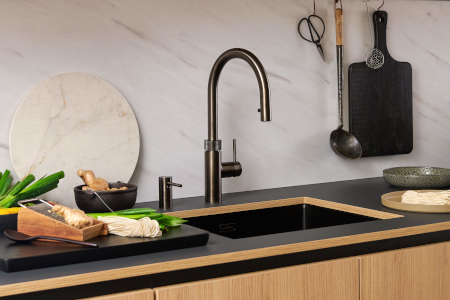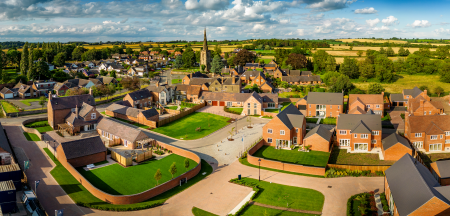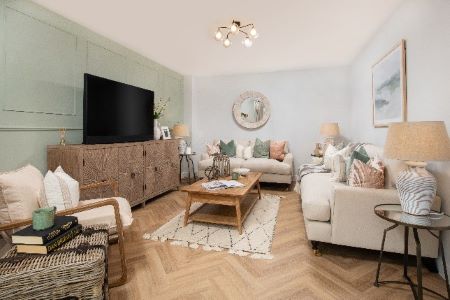Phil Viner, Commercial Director at Triton Showers explores current bathroom trends and the next generation of personalised electric showering
When bringing any product to market, it is important to ensure it is designed with the end user in mind. Consumer insights underpin Triton’s approach to understanding market drivers, highlighting growing consumer demand for sustainable solutions that save energy, water and money, while also being design-led. As a result, Triton developed a first of its kind electric shower to balance all of these aspects, namely the ENVi® – launched in June 2023.
I had the opportunity to sit down with Phil Viner, Commercial Director at Triton Showers, to discuss these latest innovations in electric showers.
What more can you tell us about the history of Triton?
As a proud British manufacturer, the company became a member of the ‘Made in Britain’ scheme in 2014 and remains passionate and dedicated about delivering style, functionality and value to its customers. Triton Showers’ products have been designed with ease of installation and unrivalled reliability in mind.
In 2021 Triton Showers achieved the Carbon Trust Standard for Carbon; followed by being accredited with Carbon Neutral status in 2021; and again in 2022 – underlining its commitment to reduce carbon emissions year on year, as part of its ambition to achieve Carbon Net Zero alignment by 2028.
Triton’s work has been verified and accredited by ClimatePartner, an independent partner which has helped the business identify appropriate projects which enable carbon savings and support the United Nations Sustainable Development Goals to improve lives, specifically via renewable energy production across Asia and removing plastic from the oceans with the Plastic Bank.
The ENVi® is Triton’s first ClimatePartner certified product. With ClimatePartner’s expert guidance, Triton has calculated the carbon-footprint of the full lifecycle of the ENVi® shower – from manufacture, upstream and downstream transport and distribution, consumer use over a five-year period and disposal.
What are the current trends in shower systems for new homes?
Building regulations are one of the main drivers of new home trends. For example, Approved Document L has significantly influenced shower spaces due to the focus on energy performance. This means electric showers are more readily accepted in new build developments, especially in second bathrooms – presenting exciting opportunities for market growth.
In terms of consumer trends, appearance, sustainability, and space-saving have become more important across the home – particularly in bathroom spaces. Dual outlet showers are also growing in popularity for aesthetic and functional reasons. Plus, our insights have highlighted that end-users want to personalise their shower experience – mainly through duration and temperature settings.
What makes a shower ‘next generation’?
A next generation solution is all about marking a new milestone in the industry. In this instance, we’re referring to an innovation that empowers customers to make a more positive impact on the environment without compromising on quality or style. ENVi® is a perfect example – the first of its kind electric shower which directly targets specific market needs.
What are the main benefits of an electric thermostatic shower?
Thermostatic showers maintain a constant water temperature, avoiding fluctuations that sometimes occur when water is used elsewhere in the house. By fitting an electric thermostatic model, showering becomes a lot safer for vulnerable users, including multi-generational households with young or elderly family members. What’s more, there is no need to compromise on safety, performance, and style, as the latest models provide a solution that meets all requirements.
Something that was highlighted in our consumer research is that users want more control over their showering experience, particularly when it comes to aesthetics and temperature.
How is this type of shower energy-efficient?
By heating water on demand, electric solutions ensure energy isn’t wasted warming water that isn’t used. All Triton electric showers are A-rated, being around 96% efficient – so 96% of the energy used is transferred into the heating of water. On top of that, we believe every drop makes a difference when it comes to showering, and our research has revealed that using an electric unit could save homeowners up to 76% in terms of energy consumption and more than 40 litres of water per five-minute shower. This is compared to a mixer shower supplied with hot water from an A-rated combi boiler. As such, it is no surprise that this technology remains a great solution for households.
How can shower designs ensure that less water is wasted?
Electric showers naturally use less water due to the way they function. They have long been an energy-efficient choice for homeowners, due to the way they draw on cold water mains to heat on demand. This means that less water is heated, and less water is wasted as the user waits a period of time for the hot water to arrive out of the showerhead. Building on these foundations, the category is continuing to evolve.
The ENVi® has been created to help empower end-users to reduce their water and energy usage and features a display that provides feedback on individual shower use. An industry first, the innovative shower is a stepping-stone to more sustainable solutions, while providing a desirable showering experience. Personalised profiles and an ‘eco’ function that reduces showers by one minute are fundamental feature that encourage behaviour change.
This also gives a nod to the fact that user behaviour is also key. If just one per cent of UK households reduce their daily shower time by one minute on average, this could save over 673 million litres of water, equivalent to 270 Olympic swimming pools. It would also reduce nearly 6.7 million kg CO2e, equivalent to removing 3,950 cars from the UK’s roads.
Are there any other features that you might introduce in the near future?
Product evolution is essential, so we’ll certainly consider additional features as we receive feedback from end-users and developers. Key to this will be reviewing how users get the most from their shower system to inform future innovations.
Moving forward, installer feedback will also be central – as it has been during product development. Once the final prototypes were designed, we invited a group of skilled installers visiting our headquarters in Nuneaton to share their thoughts on the range. Their responses aided fine-tuning and led us to include elements such as captive screws in the Tri-hub (which can be installed in unlit environments) and installation QR codes on the unit itself.
Other future predictions for this market?
We anticipate further growth for electric showers as the category’s benefits are recognised. Electric showering is the perfect, cost effective and sustainable solution, for both new build and retrofit scenarios. With the UK’s population projected to reach approximately 72 million by 2045, increased demand for housing and resources is likely. Headlines around the global water crisis are generating conversations on water insecurity fears putting the focus on efficiency. Due to electric showers being an energy-efficient choice, we’ll continue to collaborate with developers to deliver domestic showering solutions that meet the needs of end-users while preserving resources.
Read more news and exclusive features in our latest issue here.
Never miss a story… Follow us on:
Showhome
@Your_Show_Home
@Showhomemag
Media Contact
Joseph Clarke
Editor, Showhome
Tel: +44 (0) 1622 823 920
Email: editor@yourshow-home.com






